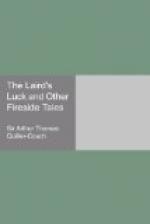I had ceased to mourn for Mr. Mackenzie, but neither to regret him nor to speculate on the mystery which closed his career, and which, now that death had sealed Mr. Urquhart’s lips, I could no longer hope to penetrate, when, on the day of my return to Inverness, I was reminded of him by finding, among the letters and papers awaiting me, a visiting-card neatly indited with the name of the Reverend Samuel Saul. On inquiry I learnt that the minister had paid at least three visits to Inverness during the past fortnight, and had, on each occasion, shown much anxiety to learn when the battalion might be expected. He had also left word that he wished to see me on a matter of much importance.
Sure enough, at ten o’clock next morning the little man presented himself. He was clearly bursting to disclose his business, and our salutations were scarce over when he ran to the door and called to some one in the passage outside.
“Elspeth! Step inside, woman. The housekeeper, sir, to the late Mr. Mackenzie of Ardlaugh,” he explained, as he held the door to admit her.
She was dressed in ragged mourning, and wore a grotesque and fearful bonnet. As she saluted me respectfully I saw that her eyes indeed were dry and even hard, but her features set in an expression of quiet and hopeless misery. She did not speak, but left explanation to the minister.
“You will guess, sir,” began Mr. Saul, “that we have called to learn more of the poor lad.” And he paused.
“He died most gallantly,” said I: “died in the act of saving the colours. No soldier could have wished for a better end.”
“To be sure, to be sure. So it was reported to us. He died, as one might say, without a stain on his character?” said Mr. Saul, with a sort of question in his tone.
“He died,” I answered, “in a way which could only do credit to his name.”
A somewhat constrained silence followed. The woman broke it. “You are not telling us all,” she said, in a slow, harsh voice.
It took me aback. “I am telling all that needs to be known,” I assured her.
“No doubt, sir, no doubt,” Mr. Saul interjected. “Hold your tongue, woman. I am going to tell Colonel Ross a tale which may or may not bear upon anything he knows. If not, he will interrupt me before I go far; but if he says nothing I shall take it I have his leave to continue. Now, sir, on the 16th day of June last, and at six in the morning—that would be the day of Quatre Bras—”
He paused for me to nod assent, and continued. “At six in the morning or a little earlier, this woman, Elspeth Mackenzie, came to me at the Manse in great perturbation. She had walked all the way from Ardlaugh. It had come to her (she said) that the young Laird abroad was in great trouble since the previous evening. I asked, ’What trouble? Was it danger of life, for instance?’—asking it not seriously, but rather to compose her; for at first I set down her fears to an old woman’s whimsies. Not that I would call Elspeth old precisely—”




